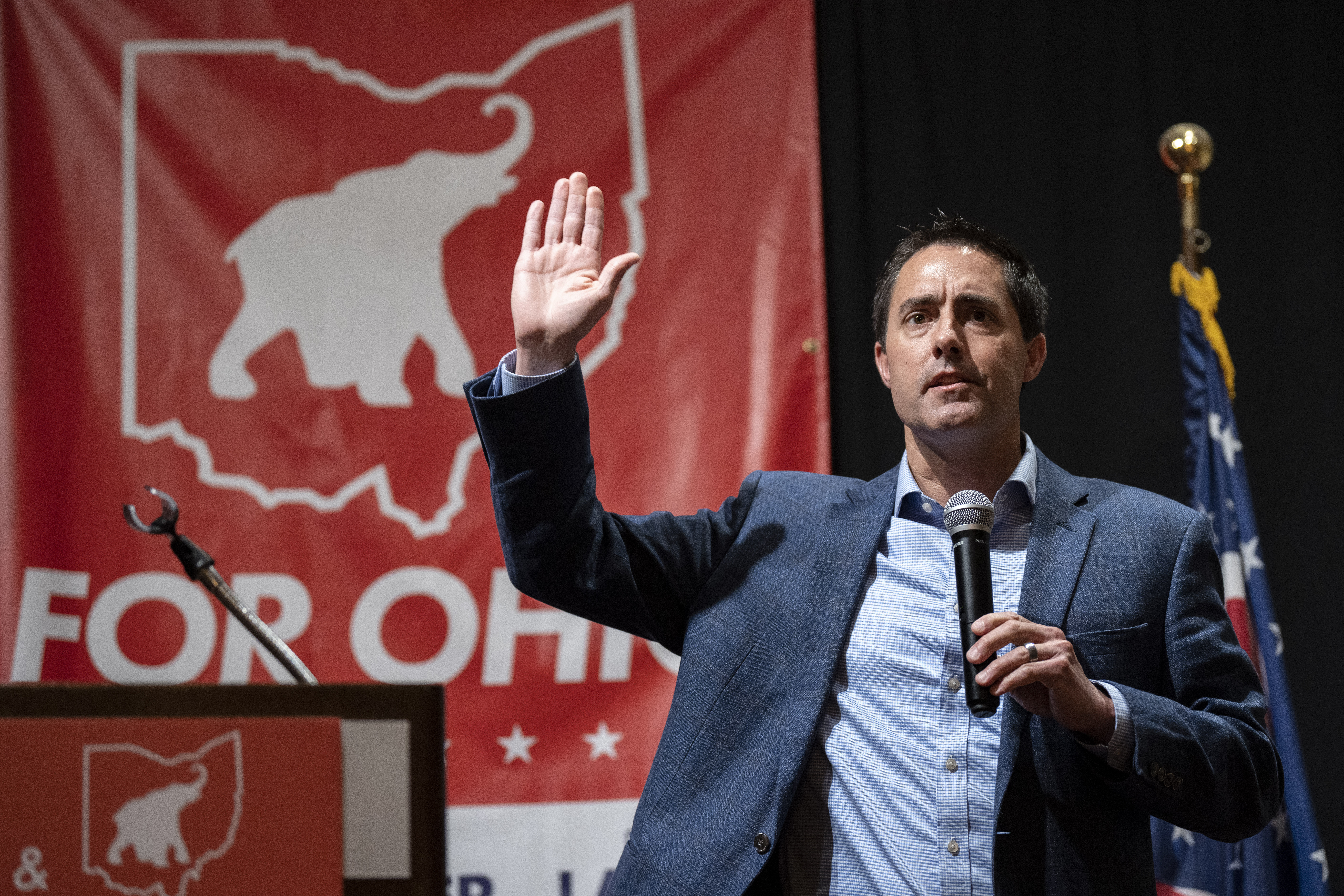Ohio’s messy GOP Senate primary gets a third candidate
Frank LaRose might have better name ID than his opponents, but they've got deeper pockets.


Ohio Republican Frank LaRose is launching a Senate bid on Monday with a hard road ahead: He has to defeat two wealthy GOP rivals for the right to challenge one of Democrats’ savviest red-state incumbents.
LaRose, Ohio’s secretary of state since 2019, is the third major candidate to jump into the primary to take on Sen. Sherrod Brown (D-Ohio) next fall. He follows Bernie Moreno, a car dealership owner, and state Sen. Matt Dolan, a scion of the family that owns the Cleveland Guardians baseball team.
Brown is one of three Democratic senators facing reelection next year in a state that Donald Trump carried in 2020 — which means toppling him is top-of-mind for GOP leaders who need to flip only two seats to win back the upper chamber’s majority. But while top Republicans are racing to avoid messy Senate primaries in other must-win states, they seem destined for one in Ohio, especially now that LaRose is entering the crowded race.
That’s in part because Dolan and Moreno are both self-funders likely to inject millions into their primary campaigns. In an exclusive interview with POLITICO, LaRose detailed his plans to go toe-to-toe with his deep-pocketed GOP rivals, both of whom have weaker statewide profiles than he does.
“I feel that I've got the strongest shot of being able to defeat Sherrod Brown,” LaRose, a Green Beret who's currently a reservist, said last week in the lobby of the Grand Hyatt hotel in Washington, D.C. “We need a candidate who has strong statewide name ID. I'm the only one that has that.”
LaRose then took direct aim at his two opponents: “They've been prosperous in their lives, and we congratulate them for that. But that doesn't make you necessarily a good public servant or a good Senate candidate or a good senator.”
National Republicans have shown they're willing to publicly wade into messy Senate primaries this year to boost their preferred candidates, and LaRose said he received encouragement to run from party leaders in Washington, D.C. But in an CBS interview this week, Sen. Steve Daines (R-Mont.), the chair of his party’s Senate campaign arm, said the committee would not be getting involved in the Ohio primary.
“When you have three candidates that any one of them could win the general election, we don't stay up late at night worrying about that,” Daines said.
Ohio's 2022 Senate primary was a dragged-out brawl for an open seat, and voters ultimately elected Republican Sen. J.D. Vance. This cycle seems to be trending in the same direction. While LaRose said he has seen polling that indicates he would start with a double-digit lead in the primary, he has his own weak spots to contend with as well.
He's likely to face questions about his loyalty to former President Donald Trump, his tenure as his state’s top elections official and his ability to keep pace with his two wealthier GOP opponents.
Still, the former state senator has less baggage from an election standpoint. Both Dolan and Moreno initially launched campaigns in 2022 for retiring GOP Sen. Rob Portman’s seat. Dolan placed third in the primary and Moreno dropped out of the race after discussing the primary pileup with Trump.
The former president is likely to play a large role in the race, with Moreno closely aligning himself with Trump, despite being a one-time critic — a similar tack embraced by Vance. While Trump publicly encouraged Moreno to enter the race, the presidential contender has not offered an official endorsement.
Moreno, who raised $2.2 million last quarter without any self-funding, did snag backing from Vance, who Trump eventually endorsed in the midterms.
“I like Frank — he’s a good guy,” Vance said. “Obviously I’ve endorsed Bernie Moreno. I think Bernie is the best guy to win in November.”
Dolan has been more critical of Trump, faulting him for perpetuating “lies about the outcome” of the 2020 election and the Jan. 6 assault on the Capitol. Trump suggested last cycle that Dolan is “not fit” to serve in the Senate. Still, Dolan says he doesn’t view himself as anti-Trump.
LaRose is somewhere in the middle. He touts that he was the only secretary of state Trump endorsed in 2022, and he says he wants Trump’s endorsement for Senate. But he's not ready to return the favor for Trump's presidential bid, saying he wants “more time to lapse” and that he will “make a decision about who I'm going to endorse at a later date.”
“I think he did a tremendous job as president,” LaRose said. “His style is not the same as mine. I conduct myself differently than he does. But I'd be proud to have his endorsement.”
And his efforts to secure a Trump endorsement could be complicated by a private recording, first reported by POLITICO, of LaRose indicating in May that power of Trump’s endorsement is overstated and that only “20 percent” of GOP voters will vote for who Trump endorses.
When asked about the remarks on the recordings, LaRose replied: “I think his endorsement matters. I don't think that you can base your campaign entirely off of that, though. I think that that's what Mr. Moreno is attempting to do.”
Ohio Democratic Party spokesperson Reeves Oyster said that “the Republican ‘slugfest’ for Ohio’s Senate seat is shaping up to be another long, contentious battle that will leave whoever emerges damaged in the eyes of Ohio voters. In the days ahead, the people of Ohio should ask themselves: what is Frank LaRose really doing for us?”
Whoever makes it through the primary will have a tough opponent in Brown. Though LaRose has hit the incumbent Democrat for creating “phony persona over the years that he's a moderate,” even Republicans acknowledge the three-term senator will be hard to beat.
Brown has weathered Ohio’s sharp turn to the right over the last decade. He beat then-Rep. Jim Renacci by 7 points in 2018, two years before Trump carried the state handily. And he's got strong fundraising chops, bringing in $5 million last quarter and ending June with $8.7 million in his bank account.
As a shadow candidate, LaRose has thrown his weight behind a ballot initiative that would raise the vote threshold needed to amend the state’s Constitution. Opponents of the measure have warned that Republicans are angling to make it harder to constitutionally enshrine a right to abortion. Republicans have pushed back against those claims, but LaRose directly linked the initiative to abortion last May at a GOP event.
“This is 100% about keeping a radical, pro-abortion amendment out of our constitution,” he said, though in subsequent statements he asserted the initiative was motivated by a desire to build greater consensus.
Still, that comment irked supporters of the amendment, who fear his comments will motivate Democrats to reject the ballot item during a special election next month. And some strategists saw his comments as an unforced error that Brown and his allies could use against him in a general election campaign.
LaRose describes himself as “pro-life” and supported Ohio’s heartbeat bill that would ban abortion after six weeks. While he supports exceptions when the life of the mother is at risk, he said he struggles with carve outs for rape and incest. Polling shows abortion protections are popular with a majority of voters in Ohio, but LaRose said he is not worried his views will hurt him in a general election.
“There's populism and then there's leadership, right?” he said. “I'm not somebody that needs to kind of stick my finger in the wind and see which way the wind is blowing.”












